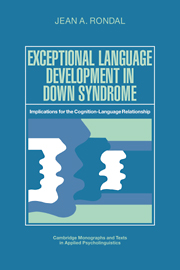 Exceptional Language Development in Down Syndrome
Exceptional Language Development in Down Syndrome Published online by Cambridge University Press: 23 December 2009
I met Françoise, my Down syndrome (henceforth DS) subject, a few years ago, at La Fermette, an occupational center for DS adults managed by APEM (Association de Parents d'Enfants Mongoliens), to which I am a consultant. La Fermette is located 30 km from Liège, in the eastern part of Belgium. Upon conversational contacts in the center, Françoise's productive language as well as her apparent excellent comprehension struck me as unusually close to normal for a DS person. In searching the specialized literature, I found that the case appeared unique enough to justify undertaking a full-scale study.
Françoise was recorded during 2 hours of free conversation with one member of my research team. She was also given a very large number of tests, verbal and nonverbal intelligence, perceptual, mnemonic, and so forth. Retrospective information was obtained on her development, education, and life since birth. This book is the product of this compilation and of the analysis and interpretations made of the data. It addresses several central questions.
First, is normal or quasi-normal language development and functioning possible in spite of severe central cognitive limitations, particularly conceptual ones? The answer, as it would appear, is partially a positive one. Normal phonological and grammatical functioning are indeed possible in such cases.
Second, how can this be the case? One possible answer, and the one that is favored in what follows, is that phonology and grammar may be acquired and function relatively independently from other central processes. Current indications in the specialized literature suggest the hypothesis of a loose tie between general cognition and particular components of the language system, such as phonology and syntax.
To save this book to your Kindle, first ensure [email protected] is added to your Approved Personal Document E-mail List under your Personal Document Settings on the Manage Your Content and Devices page of your Amazon account. Then enter the ‘name’ part of your Kindle email address below. Find out more about saving to your Kindle.
Note you can select to save to either the @free.kindle.com or @kindle.com variations. ‘@free.kindle.com’ emails are free but can only be saved to your device when it is connected to wi-fi. ‘@kindle.com’ emails can be delivered even when you are not connected to wi-fi, but note that service fees apply.
Find out more about the Kindle Personal Document Service.
To save content items to your account, please confirm that you agree to abide by our usage policies. If this is the first time you use this feature, you will be asked to authorise Cambridge Core to connect with your account. Find out more about saving content to Dropbox.
To save content items to your account, please confirm that you agree to abide by our usage policies. If this is the first time you use this feature, you will be asked to authorise Cambridge Core to connect with your account. Find out more about saving content to Google Drive.